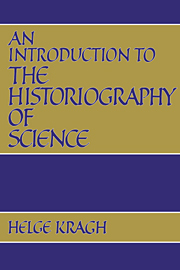Book contents
- Frontmatter
- Contents
- Preface
- 1 Aspects of the development of the history of science
- 2 History of science
- 3 Objectives and justification
- 4 Elements of theory of history
- 5 Objectivity in history
- 6 Explanations
- 7 Hypothetical history
- 8 Structure and organization
- 9 Anachronical and diachronical history of science
- 10 Ideology and myths in the history of science
- 11 Sources
- 12 Evaluation of source materials
- 13 Scientists' histories
- 14 Experimental history of science
- 15 The biographical approach
- 16 Prosopography
- 17 Scientometric historiography
- Notes
- Bibliography
- Index
12 - Evaluation of source materials
Published online by Cambridge University Press: 30 November 2009
- Frontmatter
- Contents
- Preface
- 1 Aspects of the development of the history of science
- 2 History of science
- 3 Objectives and justification
- 4 Elements of theory of history
- 5 Objectivity in history
- 6 Explanations
- 7 Hypothetical history
- 8 Structure and organization
- 9 Anachronical and diachronical history of science
- 10 Ideology and myths in the history of science
- 11 Sources
- 12 Evaluation of source materials
- 13 Scientists' histories
- 14 Experimental history of science
- 15 The biographical approach
- 16 Prosopography
- 17 Scientometric historiography
- Notes
- Bibliography
- Index
Summary
Any evaluation of primary, published materials will involve the question of whether the text can really be attributed to the author; or how authentic an expression it is of the author's own thoughts. One cannot unquestionably assume that every word in a scientific publication is that of the author. There can be many reasons for this. It is well known, for instance, that for a long time there has been a tradition in academic institutions according to which professors, directors, head doctors and similar highly placed personnel appear as the authors of papers that have really been written by, and based on, the work of younger researchers. Furthermore, one must be aware of the fact that published sources have always to a certain extent been filtered through the apparatus of publication; that editors of periodicals, for example, might have changed the paper written by the author, sometimes quite a lot, and not necessarily with the consent of the author. In earlier times it was often the right or even duty of the editor to modify the material that was submitted, rather freely. In cases like this one cannot use the published source as a reliable expression of the exact views of the author. Today, scientific articles are criticized and edited by referees; the version that is published is often a second or third version of the original manuscript and thus not a suitable source of detailed information about the views of the author. Rough sketches and earlier unpublished versions of manuscripts will be much more suitable for this purpose.
- Type
- Chapter
- Information
- An Introduction to the Historiography of Science , pp. 133 - 149Publisher: Cambridge University PressPrint publication year: 1987

